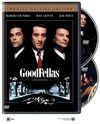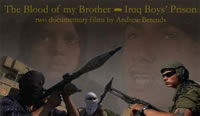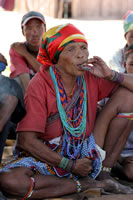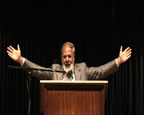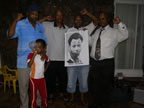|
|
||
|
Pro Tools
FILMFESTIVALS | 24/7 world wide coverageWelcome ! Enjoy the best of both worlds: Film & Festival News, exploring the best of the film festivals community. Launched in 1995, relentlessly connecting films to festivals, documenting and promoting festivals worldwide. Working on an upgrade soon. For collaboration, editorial contributions, or publicity, please send us an email here. User login |
Jim Jarmusch's Dialogue with Martin Scorsese
Scorsese is one of the few Hollywood directors who has moved from narrative features to documentaries in a career that began in the early 1970s with his breakthrough feature MEAN STREETS (1973). His documentary career even proceeds that triumph. Scorsese began as an editor on the milestone music documentary WOODSTOCK (1970), a 3-hour-plus chronicle of the music concert of the century. One year after his breakthrough, Scorsese directed his first documentary, the revelatory ITALIAN-AMERICAN, a portrait of his parents, his extended family and the Little Italy community that was his world until adulthood. The film is alternately hilarious and harrowing, as it shows the intimacy and friction of family life in the tenement apartment where he and his older brother came of age. Cinema and music have been the twin obsessions in Scorsese's life and documentary film career. The influence of the Italian neo-realist films that he first saw on a black and white television set in his youth is the basis of the evocative MIA VIAGGIO EN ITALIA (My Voyage To Italy, 1999). Scorsese offers a movingly poetic narration to the influence that the powerful images of such film giants as Rossellini, De Sica, Visconti and Fellini had on his life and cinematic imagination. In the earlier A PERSONAL JOURNEY THROUGH AMERICAN MOVIES (1995), Scorsese chronicles the influence on his life and career of such Hollywood masters as John Ford, Frank Capra, Billy Wilder, Vincente Minnelli, William Wyler and Howard Hawks. Film critics have always drawn parallels between Scorsese's films and the genres perfected by these studio giants. His interest in American music and the musicians at its core have been wonderfully realized in such landmark documentaries as THE LAST WALTZ (1978), THE SOUL OF A MAN (2003), THE BLUES (2004) and last year's triumphant biography of legend Bob Dylan, NO DIRECTION HOME (2005). The tribute began with a clips reel that featured highlights from Scorsese's nearly 25 year documentary film career. After much applause, Jim Jarmusch and the evening's honoree Martin Scorsese were introduced. What follows in an excerpt of their on-stage conversation. Jim Jarmusch: I really love your first documentary, ITALIAN-AMERICAN. How did that project come about? Martin Scorsese: The film was made as part of a series on different ethnic groups in New York as part of the Bicentennial celebrations in 1976. I was assigned to do a film on the Italian-American experience, but I told the producers that I did not want to make the standard historical film, using film clips and narration. So, I just decided to have dinner with my mother and father in their tenement apartment in Little Italy. The film was shot over two weekends, and was really just a response to a series of questions that I posed to my parents. Their on-screen bickering was not planned, but was certainly realistic. I think the film showed off my parents deep love for each other, in spite of all the arguing. Jarmusch: How did your experience on this documentary effect your later narrative work? Scorsese: Well, it was very free form and just concentrated on the faces, speech and movement of the two main characters, my parents. This informed my later films RAGING BULL and GOODFELLAS, where so much is expressed in the way characters look and talk at one another. I also realized while making ITALIAN AMERICAN my deep interest in the films of Elia Kazan, particularly EAST OF EDEN and ON THE WATERFRONT, which are stories of the inability of family members to communicate their true feelings to one another. This theme has come up many times in almost all of my films. Jarmusch: Your film about the Italian neo-realist cinema, MY VOYAGE TO ITALY, is very beautiful. In it, you mention that in the films of Luchino Visconti, who is a personal influence of yours, that style is everything. What is the role of style in your films? Scorsese: The classic Italian cinema emotionally moved me when I first saw them on television as a kid. Their raw naturalism and enhanced melodrama really influenced my thinking about films. That plus the influence of the films of John Cassavetes, which were so raw in emotion and so inventive in their camera techniques. I think that the best way to describe my style is a mix of European and American influences, creating a kind of hybrid style that has a nod to both those traditions. In my films, there is a constant struggle between style and substance, a conflict etween direct simplicity and more elaborate stylization. I still feel that struggle every time I make a new film. Jarmusch: Your feature film career has always been interspersed with documentaries. What was the difference in approach between these two? Scorsese: The material leads me to the style of any particular film. With documentaries, it's the subject matter and the people who are being portrayed that suggests my approach, the shooting and editing decisions and the overall look of the film. Music also plays a strong part. In my feature films, I have been able to use some of my favorite musical pieces, everything from popular music to blues to jazz to rock. In THE LAST WALTZ and the Bob Dylan film, I was working with lots of footage that either I shot or I found. The challenge there was to find the story hidden in all that footage and give it some kind of coherent shape. The goal is always trying to get at the truth of your subject, striving for authenticity and human truth. Jarmusch: You executive produced THE BLUES series and directed one of the episodes. What inspired you to make this television series? Scorsese: I was interested in the roots of this very original American music. So, I followed its origins in Africa and then through its integration into the American musical experience. The idea of tracing the roots of the blues came to me when I did a 1994 music documentary on Eric Clapton (NOTHING BUT THE BLUES). We originally inserted some terrific archival footage in that film, but Clapton felt uncomfortable comparing himself to such greats as Muddy Waters, Robert Johnson and Leadbelly. So, we scrapped that footage but it started me thinking about doing a series where we really could explore the origins of the music and give profiles of some of the talented musicians who lived the blues. Jarmusch: What kind of music do you listen to and does it inspire you during filmmaking? Scorsese: I listen to more melodic music, I guess. I don't really get hip hop. I have listened to a good amount of it, but I must admit that I don't really understand most of hip hop. I like everything from Hank Williams to Radiohead, and also a lot of classical music. Music is a definite inspiration for me. 16.06.2006 | silverdocs's blog Cat. : Academy Award Africa Ambiance American film directors Billy Wilder Bob Dylan Charles Guggenheim Charles Guggenheim Cinema of the United States Clapton documentary career Elia Kazan Film Frank Capra Goodfellas Hank Williams Howard Hawks Italian films Italy Jim Jarmusch Jim Jarmusch Jim Jarmusch John Cassavetes John Ford Luchino Visconti Martin Scorsese Martin Scorsese Martin Scorsese Mean Streets MIA VIAGGIO EN My Voyage to Italy MY VOYAGE TO ITALY New York No Direction Home Raging Bull Robert Johnson The Last Waltz the Silverdocs Vincente Minnelli Voyage To Washington DC William Wyler Hollywood Honors Independent Interviews FILM FESTIVALS PEOPLE
|
LinksThe Bulletin Board > The Bulletin Board Blog Following News Interview with EFM (Berlin) Director
Interview with IFTA Chairman (AFM)
Interview with Cannes Marche du Film Director
Filmfestivals.com dailies live coverage from > Live from India
Useful links for the indies: > Big files transfer
+ SUBSCRIBE to the weekly Newsletter Deals+ Special offers and discounts from filmfestivals.com Selected fun offers
> Bonus Casino
User imagesAbout silverdocs Online Dailies from SILVERDOCS FILM FESTIVAL Dates: June 13-18, 2006 View my profile Send me a message The EditorUser contributions |






















